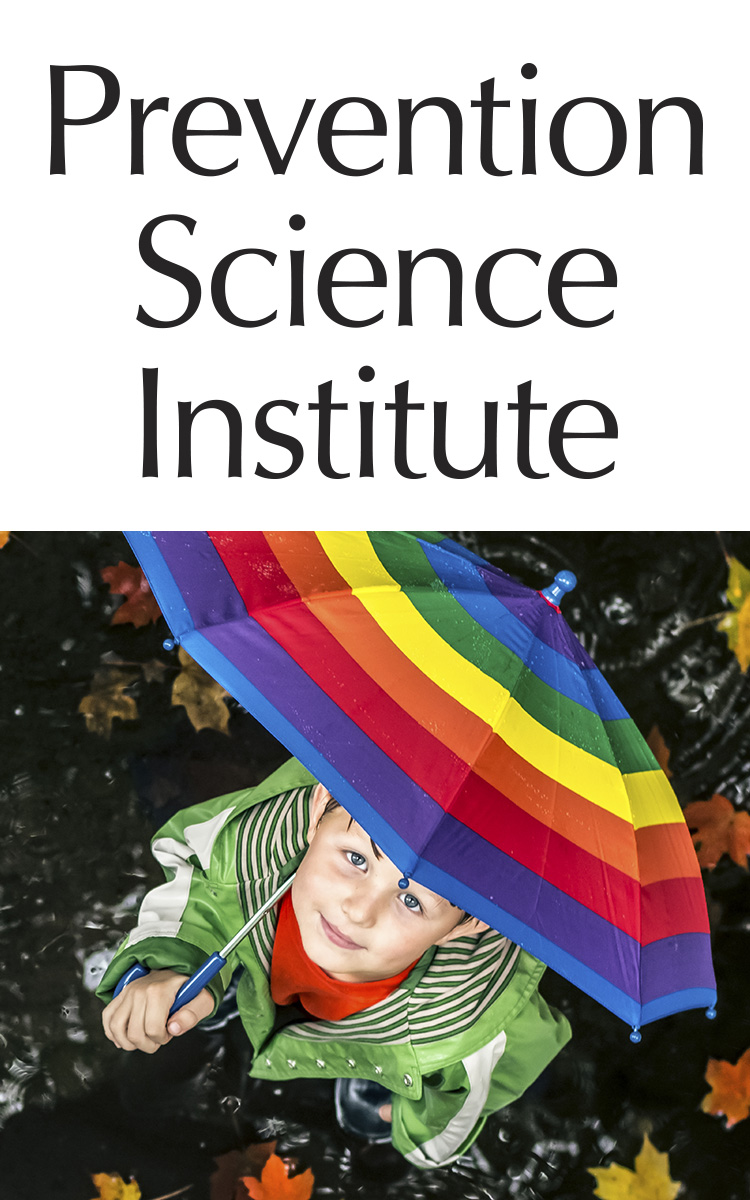In 2015, seventy-six articles published in peer-reviewed journals reported findings from PSI studies.
Welcome to the Prevention Science Institute
The Prevention Science Institute at the University of Oregon is a multidisciplinary research institute where scientists understand human development, prevent behavioral health problems, and implement effective interventions in community settings. The PSI evolved from the Child and Family Center, which remains as a center within the PSI. The PSI is entirely funded by federal grants and other sponsored research. Our primary funders include the National Institutes of Health and the U.S. Department of Education. The PSI includes faculty from across campus who work together to understand prevention and health promotion through translational science and applied intervention research.
Mission
The core mission of the PSI is to improve the lives and well-being of at-risk children, individuals, and families throughout the lifespan. PSI's three major focus areas are consistent with the field of prevention science: translational neuroscience, prevention and intervention, and implementation science. PSI researchers identify effective interventions and the outcomes associated with these interventions across multiple domains of functioning, including biological, social, and contextual. The PSI is committed to research that expands our understanding of interventions and development among diverse populations and actively promotes research that reduces health disparities in service utilization. Collaboration is fostered in all areas of prevention science and among researchers and faculty across disciplines, including psychology, social and affective neuroscience, development, and education. Our work is conducted in partnership with local, state, national, and international organizations and researchers, including child welfare service providers, school district leaders, mental health providers, criminal justice system leaders, and policy makers. Together, we work to understand and promote healthy adaptation in children and families, with a particular emphasis on the dissemination of effective interventions to real-world settings.
History & Background
For more than two decades, the University of Oregon has maintained a strong presence in the field of prevention science, with extensive federal grant-funded research in all areas of prevention relevant to the human lifespan. The field has been rapidly expanding to include the study of new populations (e.g., those with autism spectrum disorders) and new methodologies (e.g., neuroimaging) and an emphasis on the interplay between neuroscience and intervention science. Earlier, the university's programs of research had been spread across departments (psychology), colleges (College of Education), and centers (Child and Family Center), and it was difficult to bring together the various areas of interest. Fortunately the university's strengths in all the areas of prevention science made it well situated to capitalize on these competencies through an organized focus that has brought together facutly expertise in the Prevention Science Institute.
Research Foci
PSI's research is guided by a synergetic emphasis on translational neuroscience, prevention/intervention science, and implementation science. In each of these areas, the understanding of basic developmental processes is incorporated into models of risk and adaptation that predict behavior across the lifespan, from early childhood to adulthood. This synergism is a key strength of our collaborative team as we develop and test theories of change.
Graduate Education
Enhancing interdisciplinary graduate education in prevention science is a core focus of the PSI. The institute provides multiple opportunities for graduate training by (1) housing an NIH-funded T32 training grant that supports predoctoral and postdoctoral trainees; (2) obtaining predoctoral minority supplements to funded R01 grants to support qualified minority doctoral students; (3) providing a research training structure for graduate students in the new prevention science master’s program offered by the university's counseling psychology and human services program; (4) providing applied settings for students in counseling, school, and clinical psychology for training in evidence-based practice; and (5) providing mentorship and support for graduate students submitting applications for independent funding, such as NRSA and NSF fellowships and foundation fellowships.



